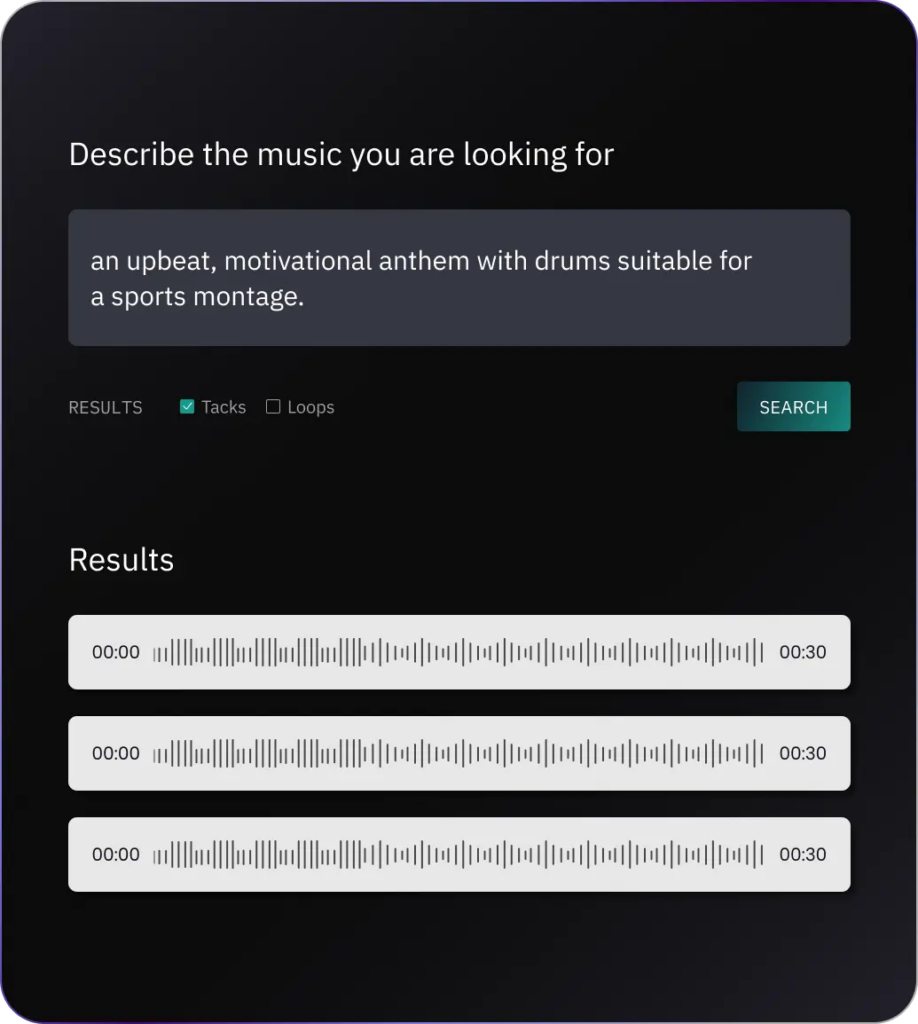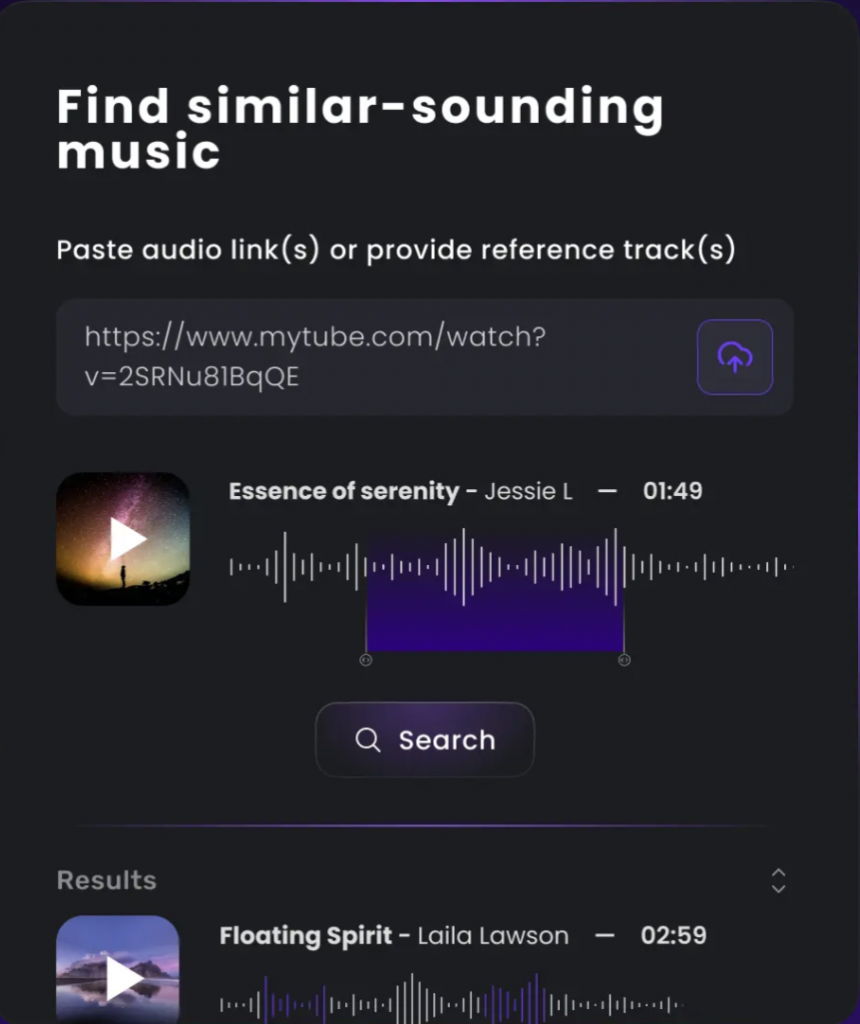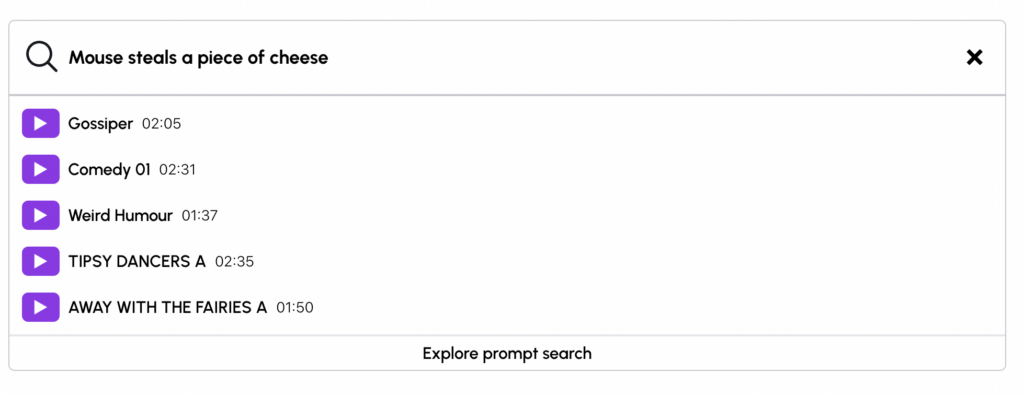Wondering why creators are complaining about your music library?
Why do they almost never find the music they are looking for?
It is because your music library still uses the same old tag-based search algorithm. Tags restrict users and often lead them to similar or wrong results.
This results in lots of negative reviews and churned users.
You need an AI music search tool that enables prompt-based search to help users locate the music they choose within seconds.
In this article, we have handpicked 4 best AI music search tools for you.
By the end of this piece, you’ll be able to select the best AI music search tool for your specific use case.
Let’s go!
What is an AI music search tool?
An AI music search tool simplifies music search for creators. You can use tailored prompts, examples, lyrics, and names of singers and musicians to find music for your content. Unlike traditional music libraries where music is listed based on tags and finding the right track sometimes takes hours, the scenario differs for an AI music search tool. Here, you can find your desired music by typing long sentences.
Advanced AI music search tools can locate a piece of music even with typos and spelling mistakes.
4 Best AI music search tools in 2025
Here are the four best AI music search tools to opt for in 2025:
Beatoven.ai: Best for original background music production and prompt search

Beatoven.ai is an AI music generator for content creators. It creates original, royalty-free background music for your YouTube videos, Instagram reels, podcasts, games, and other content formats. Beatoven.ai’s text-to-music tool allows you to generate music with text prompts.
Recently, Beatoven.ai has launched its AI music search API. You can integrate it with your music library to enable free text search. With this integration, you can go beyond tag-based music search and encourage users to express their music needs in more detail using text prompts and long sentences.
Beatoven.ai’s algorithm is continuously evolving, leading to more efficient API features.
Cyanite: Best for mood and genre-based music matching

Cyanite is an AI music solution for tagging and music search. This platform allows you to discover your desired tracks with intuitive prompts. This powerful tool can analyze long texts and paragraphs to locate the right song of your choice.
Cyanite also comes with similarity search capabilities. You need to input a reference song of your choice; Cyanide analyzes its mood, tempo, voice, etc., to showcase other songs of the same genre and vibe.
Harmix: Best for multiple search options, including video

Harmix is an AI music search tool that offers prompt-based, similarity, lyrics-based, and video search features to its users. Its large music catalog allows users to apply search modes to locate the right music.
The prompt search feature allows you to describe a scenario, whereas the similarity search feature requires a user to provide a reference track to locate the desired one. The lyrics search involves typing specific keywords into song lyrics. To opt for the video search feature, you will need to upload the video in question. Harmix will analyze it to recommend appropriate songs.
AIMS: Best for multilingual music discovery

AIMS allows users to explore music through prompts, lyrics, and similarity searches. This AI song search tool is compatible with any language or keyword and creates a fast search experience by uncovering music of your choice from its existing catalog. AIMs also come with a search API that can be included in your music proprietary tool to create a fast search experience.
Features to look for in AI music search tools
When looking for an AI music search tool, make sure that the following features are available:
Text-based search system
Instead of relying on simple tags, AI music search tools must process and understand regular sentences and descriptions. The system should recognize what users want even when they write casual descriptions or make small spelling mistakes.
Various music discovery modes
Music search platforms work best when they let users find songs differently. Users might want to describe what they’re looking for, show an example of a similar song, search using lyrics, or match music to a video. They should also work with any language the user prefers.
Smart music recognition
The technology should look at many parts of each song, from its overall feeling to its speed and singing style. This helps match users with exactly what they’re looking for, making the process more accurate.
Fast and precise search results
When users search for music, they need answers right away. The system should quickly understand what they’re asking for and show them matching songs, even when their search terms aren’t perfect.
Supports multiple music types
The search system needs to handle different kinds of music files and work across large collections. It should easily connect to existing music libraries and search through everything available to find the right match.
Conclusion
As AI music search tools become more common in 2025, picking the right one depends on your needs. These tools make finding music easier by letting users search naturally – whether through words, similar songs, or even video matching. For the best results, look at how well they understand natural language, how quickly they work, and whether they fit your current music setup.
We suggest Beatoven.ai for its ethical music initiatives, ease of use, and free availability.

Sreyashi Chatterjee is a SaaS content marketing consultant. When she is not writing or thinking about writing, she is watching Netflix or reading a thriller novel while sipping coffee.

